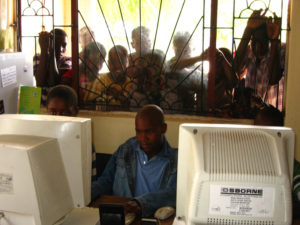We’ve been in South Africa now for just over a year. It’s crazy how time flies! I can still vividly recall our goodbyes at home, our initial training, our various expectations for what South Africa would be like, all our ideas of what we might do here. Our perspective has definitely changed in most of those regards, but it’s hard to believe we’ve really been working here for more than a year already.
It’s funny because there’s not a lot that we can say we’ve “accomplished” already – that’s one of the things that makes the one year mark seem unbelievable. But in some ways you may say time flows differently here. What may take 10 minutes in the US may take 1 hour here. Or what may normally be accomplished in a week there may take several months here. And what may take a year in America, well, that may not even happen within someone’s lifetime in South Africa. But whether or not time really flows differently here, I can tell you that certainly it’s perceived differently.
More loosely, you might say. Everyone here is very well aware of time, they have words in their language for referring to it and they understand you when you talk about it. But maybe they don’t understand you quite the same, at least not the way us Americans talk about time: most Shangaan people here just don’t put as much weight into it. I guess to them, time means something, just not everything.
Let’s take this for example: if I told you something started at noon, you’d check your watch before arriving and make sure you came probably not more than 15 min. early (if it was very important), but probably not more than 15 min. late. Most likely you’d arrive within a few minutes of noon. If for some reason you didn’t have a watch/clock with you (unlikely as it is), you’d make sure to ask someone, wherever you were, what time it was. That question, “what time is it?”, is one of the first questions Westerners learn when learning a new language, right up there with “where’s the bathroom?” But even the chance of you being caught without your own personal reference to time is very slim.
A contrasting example is when we recently started a program here whereby we set up some computers in our house (borrowed from one of the schools we work at) so that kids in the village could come over and learn to use them and also participate in some other activities at our house during the recent school holiday. We made sure all the kids knew that the program would be starting at twelve and continuing until four every weekday and we even had a translator with us just to be sure they understood.
So, a few days before it was supposed to start, we had some kids stopping by asking if it had already started. There weren’t a lot of them, but a few throughout each day, and so we continued to remind them it didn’t start until Monday and that it was going from noon to four.
Well, on Monday we were glad to sleep in for once, but by the time we woke up just after eight, there were already several kids waiting outside for us. They actually assumed it was already starting and didn’t even think to ask whether or not it really had started yet. So we reminded them again that it would be starting at noon and to come back in a few hours. About thirty minutes later, a different set of kids came by and we told them the same story.
Within another thirty minutes or so later, both of the first two groups of kids had returned and were ready to begin. We told them they still had to wait three more hours and most of them looked pretty surprised. This cycle continued every thirty minutes to an hour until it was close to twelve and we decided to go ahead and begin.

The computers at our house always attracted a big crowd of spectators at the window, just waiting their turn.
We thought for sure that because they had to wait so long the first day before we started, that they’d come back much closer to noon the next day. But it wasn’t so – the kids kept coming anywhere from 2-3 hours early every day for weeks. They’re not completely without clocks either – they could’ve asked any teenager or adult what time it was, since almost all of them have cell phones. But they didn’t just come early, a lot of the kids came late also – sometimes even after four, so we’d send them away saying we’d already finished for the day.
One day, for whatever reason, we only had 2 boys show up by noon. So, I didn’t even set the timer, I just let them play games on the computers for about an hour and then told them their time was up when a couple other boys showed up. Because I never set the timer, it also never ringed when I told them they were finished. The boys looked at me almost stunned, like they couldn’t believe their time was finished already. These kids apparently couldn’t very well distinguish between 5 minutes and 1 hour… and these aren’t little kids – most of them were around 12-14 years old. We only had two computers set up, so we had them all take turns. They knew that their turns were only 5 minutes long each. But, the first few days didn’t have quite as many kids as we expected, so we gave them a bit over 10 minutes each. However, the kids always referred to their scheduled time as 5 minutes. Later, as we got more kids, I did reduce their time to five minutes, but no one seemed to notice the difference at all.
But it’s not just the kids. It was simply that activity with them that made me realize why people are always so late to events here, and it made me recall a lot of details that I’d previously overlooked.
It’s true that people were always late to events, sometimes several hours late, sometimes arriving even long after the event is over. But it was also true that people were often very early, even several hours early. As an American, I simply barely noticed that people were early; I was only concerned if they were late, especially since most people were never on time when it involved us, like when we hold training sessions for the teachers. We were thinking maybe they were lazy or something, while for us, we were just trying to use our short time here wisely. But the reason they’re late, or early, is because a unit of time has a much wider definition for them than it does with us.
A minute to an average Shangaan person is just a short unit of time, so short it’s hardly even mentioned. A typical short unit of time might be anywhere from 5 minutes to 1 hour – that segment of time more or less blends together for them. A medium segment of time is anywhere from a few hours to half the day. And a long segment of time is something that takes up the full day, or maybe even multiple days. Within these few segments there’s a LOT of leeway, not really observed by most rural Shangaan people; it’s just short, medium, and long segments of time.
In sharp contrast is us Westerners, closely measuring our hours, our minutes, even our seconds. If we set a specific time to start something, then that’s when we’re going to start it and anyone showing up significantly early or late is disrespecting the time available to everyone involved. If we tell someone we’ll do something within a certain span of time or be available at a specific time, it’s considered a slight (or in some cases, major) offense to not be ready by that time.
But here, one commonly heard phrase is, “Na vuya sweswi!” – meaning literally, “I’m coming now!” The thing that quickly clued us in to its other-than-the-obvious meaning was that people always said this at the same moment that they were actually leaving. So, someone may be passing by the house, you engage them in customary greetings, tell them they should come in for a visit, and they tell you “I’m coming now!” just as they’re walking off!
That person may show up a bit later, maybe a few hours later, maybe the next day, but oftentimes a person who says that will make an appearance at some time in the future. But, “now” definitely doesn’t mean now. For them to shorten that period of time, they’ll double it and say “sweswi sweswi!” or “now now!” which basically means “with some urgency”. It still doesn’t imply a strict time limit, but it does usually mean that coming back to you will be the next thing that person does. And that’s certainly a lot quicker than it might be otherwise
This vague reference to time isn’t only applicable in the present. When we first arrived, many people told us of this guy named “Greg”, apparently the only other white person to have spent much time talking to a lot of different people in the village. Everyone talked about him like we’d just missed him, like he’d just left the day before, and maybe we’d bumped into him on his way out. Even beginning to realize people’s broad usage of units of time, we assumed he must’ve been there within the last year. But no; recently we learned that the last time Greg was really seen around here was 5 years ago!
It’s the same with the patriarch of our host family. He’s referred to in nearly the exact same way, as if he’d only passed away yesterday. But it was with the same result – he died almost 10 years ago! I guess for people who don’t distinguish much between units of time in the present, neither does the past ever seem too far away.
It’s also probably why most people don’t know how old they are. Every time, they have to recall the specific year a person was born in and subtract from the current year. They simply don’t regularly keep track of the passing time.
However, as might be expected, Shangaan people do seem to have at least a few mechanisms for remaining somewhat cohesive in such a loose time structure. One important method is that events are classified by type. Certain types of occasions all start at the “same time” regardless of who’s holding the occasion or where it’s located.
For example, all funerals start at “6 AM”; it’s the exact same answer we get every time we ask, no matter who we ask. But that answer’s not exactly accurate (in the American sense) and we can tell you from personal experience that they sometimes start a full hour or more after that. But sometimes they start an hour or more earlier. What we’ve realized people mean by “6 AM” is just some time corresponding with when the sun rises, or shortly after it.
Parties and other celebrations (like weddings) always start at “9 or 10 AM”. Always. No one ever knows when they actually start, because that’s when they “always” start. Apparently that’s around the time most people finish their morning chores, so they begin showing up for the event. Sometimes a given event like that might actually be delayed until 1 or 2 pm, but no one ever seems to mind. As far as most people are concerned, it started around 9 or 10 am.
They take this same easy-going approach to time no matter what it is they’re waiting on. Grocery store lines are rarely less than half an hour long, and if it’s near the time of the month when most people are paid the lines are usually an hour long or more. The lines in banks here are ridiculous, almost always lasting a few hours.
But I’ve never really seen any Shangaan person in one of these lines, in either the grocery store or the bank, looking upset about waiting. They say the wait to get into the hospital is even worse. They say they have to show up at 6 AM on one day, wait most of the day to get an appointment, and then show up again at 6 AM (noticing a trend?) the next day to wait for their turn in the appointment schedule. But they take it all in stride.
After all, if you don’t easily distinguish between five minutes and one hour, what’s a simple wait in line? But for us Westerners, who are acutely aware of each second and minute passing, those kind of waits can be grueling. For Lora and I here, we’ve had to adapt, at least somewhat, to this new perspective on time. It means things go slower, or at least are “accomplished” more slowly.
But it’s also very liberating in many ways. We can occupy our minds with other concerns, rather than worrying about minutes lost here and there. Certainly a preoccupation with time won’t affect the actual speed at which time passes, nor will it bring back any given minute just because we’ve realized it was “wasted”.
The truth is, I think our Western obsession with constantly monitoring the passing of minute quantities of time can be damaging to relationships and even contribute to over-inflated self-esteems. It makes us easily offended when people don’t respect our time, and thus we’re quick to offend in return. We often value available quantities of time more than the people who  might otherwise occupy them. And we’re so used to watching the minutes and the hours that belong to our own lifetimes that we easily forget what a vast quantity of time has passed before us and how much will likely pass after us. We begin to believe the only thing that matters is the infinitesimally small amount of time which affects us because with our attention so narrowed, it’s often the only thing we see. We tend to miss the big picture.
might otherwise occupy them. And we’re so used to watching the minutes and the hours that belong to our own lifetimes that we easily forget what a vast quantity of time has passed before us and how much will likely pass after us. We begin to believe the only thing that matters is the infinitesimally small amount of time which affects us because with our attention so narrowed, it’s often the only thing we see. We tend to miss the big picture.
It’s probably also why we have so much trouble relating to that Bible verse about God, the one in 2 Peter 3:8 that says, “…with the Lord one day is like a thousand years, and a thousand years are like one day.” We usually only hear about that verse preached or sung in regards to the concept of “eternity” especially an eternity in heaven, and even then most of us are generally baffled and quickly move on to another topic of thought. It’s also why if we get to thinking about Jesus’s return, we may easily wonder exactly what it is that’s taking him so long to come back. He did say he’d be returning soon, right? So doubt begins.
But that verse doesn’t seem to be so much a reference to eternity in heaven as it is an explanation of the looser view of time that God takes, maybe in some ways similar to the culture that Lora and I are living in now. It’s obviously not a reference to our American culture or we wouldn’t have such a hard time relating to that verse. No… that verse is definitely more an explanation of God’s own unique perspective on time, a reminder even.
The slightly larger context for that verse reads like this: “But do not ignore this one fact, beloved, that with the Lord one day is like a thousand years, and a thousand years are like one day. The Lord is not slow about his promise, as some think of slowness, but is patient with you, not wanting any to perish, but all to come to repentance.”
It’s a particularly good reminder for us living here and adapting to this new culture, a place where we tend to think people are “slow” or even worse, “lazy”, because of their perspective on and use of time. Now, our situation helps brings a much clearer meaning to these verses. If translated to vernacular xiTsonga, Jesus’s promise of return might have been, “Na vuya sweswi!” He’s coming now, or soon. But then again, what is soon really? According to Peter, God takes a much looser view of time, much more broad even than the Shangaan people that Lora and I are living among.
What Jesus is saying is that there’s a few things he’s taking care of first. One of those things is bringing about the redemption of more people. Another he mentioned is preparing a place for us in his Father’s house. But he said he’ll be back soon. He hasn’t forgotten, he hasn’t delayed, and he’s not slow about it, at least not as we’re used to thinking about slow.
Maybe we should try to adapt to that broader view of time that he has and stop trying to count the minutes and seconds… then when Jesus returns, we’ll be ready for him, not impatient and not with bad attitudes or false expectations. We’re very thankful that the Shangaan people and their culture have helped us to better understand that.




